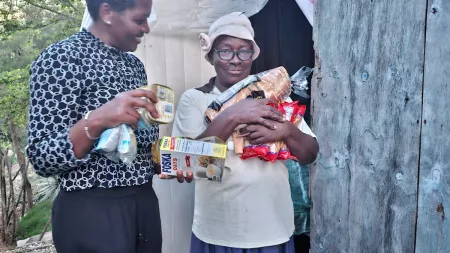Three months after Hurricane Beryl, the earliest Category 5 hurricane to ever form, tore through the Caribbean Basin, devastated communities are continuing their long road to recovery. Since landfall, CARE and the Caribbean Gender Alliance have been supporting the most vulnerable affected by this historic storm. This work has been carried out through their Caribbean Humanitarian Partnership Platform, a network of lifesaving, locally-led, women-focused organizations mobilized and supported by these two organizations immediately following largescale disasters in the Caribbean.
Across the three most-impacted countries – Grenada, St. Vincent and the Grenadines, and Jamaica – up to 180,000 people have required humanitarian assistance since the storm’s landfall. In Grenada, 98 percent of the infrastructure in Carriacou and Petite Martinique islands was destroyed. In St. Vincent and the Grenadines, Beryl caused losses of 98 percent of banana and plantain production and the destruction of the lobster and fisheries sector. And in Jamaica, 82 health facilities reported major damage and upwards of 45,000 farmers are estimated to have agricultural losses at around US$15.9 million.
“Over the past three months, we have seen the very best in humanity following some of the worst devastation imaginable."Nadella Oya, Chair, Caribbean Gender Alliance
“Over the past three months we have seen the very best in humanity following some of the worst devastation imaginable. On one hand, we saw neighbors rallying around each other for support and protection. And we also saw our Caribbean families made vulnerable in many ways affecting their mental health, access to food, and safe shelter. We have long-term work to do to recover,” said Nadella Oya, Chair, Caribbean Gender Alliance.
“Beryl is yet another example how climate change affects those that are causing it the least. Caribbean women and girls are leading the Beryl response, and we are proud to stand alongside all those affected as they mark three months since this catastrophe,” said Jonathan Arogeti, Caribbean Humanitarian Response Lead, CARE. “That said, it’s important to note women and girls who are disproportionately affected by disasters like this.”
“Beryl is yet another example how climate change affects those that are causing it the least."Jonathan Arogeti, Caribbean Humanitarian Response Lead, CARE
In partnership with the Caribbean Association for Youth Development (Grenada), the Jamaica Network of Rural Women Producers, and Helen’s Daughters (St. Vincent and the Grenadines), CARE and the Caribbean Gender Alliance’s response has been prioritizing cash and voucher assistance providing immediate financial support to the most vulnerable families; livelihood recovery helping people, especially farmers, restore their sources of income; and protection focusing on the safety and well-being of the most at-risk populations, with a particular emphasis on women, children, and the elderly.
“Through our partnership with CARE and the Caribbean Gender Alliance, the cash and voucher assistance provided after Hurricane Beryl was our first significant step in helping our members rebuild not just their businesses and farm infrastructure but also their mental well-being,” said Keithlin Caroo-Afrifa, Executive Director, Helen’s Daughters.
"It’s important to note women and girls who are disproportionately affected by disasters like this.”Jonathan Arogeti, Caribbean Humanitarian Response Lead, CARE
“The timeliness and relevance of their assistance have strengthened our capacity to prepare and recover from Beryl which was a devastating event. The support also helped to build long-term resilience. This support continues to enable our women farmers by providing the tools and resources needed for effective disaster preparedness and inspiring hope, enabling us to safeguard our livelihoods and protect our communities,” said Tamisha Lee, President, Jamaica Network of Rural Women Producers.
Global warming results in more intense and destructive hurricanes, like Beryl, that carry higher wind speeds and more precipitation. Latin America and the Caribbean are suffering many of the worst effects of the escalating climate crisis despite contributing less than 10% of global emissions. CARE calls on wealthy and high-emitting countries responsible for this crisis to deliver on their commitments related to climate finance, especially funding for local adaptation initiatives and accelerate the roll out of the Loss and Damage Fund, which must be timely replenished and include a CSO small grants window. Climate funding must be accessible to local organizations, particularly women-led, who are at the forefront of the actions to adapt to extreme weather.
For media inquiries, contact [email protected]
